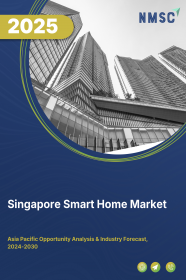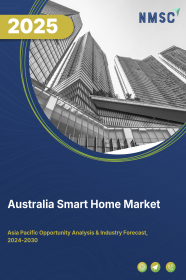
Singapore Smart Home Market by Product Type (Smart Lighting, Smart Home Security & Surveillance, Smart Entertainment, and Smart Appliances), by Communication Protocol (Wi-Fi, Zigbee, Z-Wave, Bluetooth, and Thread), by Smart Home Hubs (Standalone Hubs and Built-in Hubs), by Voice Assistants Integration (Amazon Alexa, Google Assistant, Apple Siri, and Others) – Opportunity Analysis and Industry Forecast, 2024–2030
Industry: Retail and Consumer | Publish Date: 15-Feb-2025 | No of Pages: 140 | No. of Tables: 104 | No. of Figures: 69 | Format: PDF | Report Code : RC2281
US Tariff Impact on Singapore Smart Home Market
Trump Tariffs Are Reshaping Global Business
Singapore Smart Home Market Overview
The Singapore Smart Home Market size was valued at USD 1.79 billion in 2023, and is predicted to reach USD 7.90 billion by 2030, at a CAGR of 23.6% from 2024 to 2030. A smart home, also referred to as a connected home, is a residential space equipped with cutting-edge technology and automation systems. These systems allow for the centralized control and monitoring of a wide range of household devices, appliances, and security features through a unified network. The smart home devices can be managed remotely and often respond to voice commands or pre-set schedules, providing homeowners with enhanced convenience, energy efficiency, and security. Connected homes typically incorporate components such as smart thermostats, lighting systems, security cameras, voice assistants, and other interconnected devices, all aimed at enhancing the overall living experience.
Government-Led Smart City Initiatives Propel Market Growth
Government initiatives to develop smart cities in Singapore are driving the growth of the smart home market. These initiatives prioritize the integration of advanced technologies and sustainable practices into urban planning, creating a demand for connected home solutions.
For example, Singapore is leading the development of Tengah Eco-Town, a sustainable city with 42,000 homes that emphasizes eco-friendly urban planning, urban farming, car-free zones, and green spaces. This initiative showcases Singapore's dedication to smart cities, focusing on sustainability and community well-being while incorporating cutting-edge technologies. Singapore's commitment to creating eco-friendly and technologically advanced cities encourages residents to adopt connected home technologies, aligning with the vision of smart, connected living and boosting the Singapore smart home market growth.
Digitalization Trend Drives Demand for Smart Home Solutions
The Singapore smart home market demand is fueled by the growing trend of digitalization. As more citizens embrace digital technologies for work, education, and entertainment, there is an increasing demand for connected home solutions offering convenience, connectivity, and control. Singapore has emerged as a prominent tech and innovation hub in Southeast Asia, boasting numerous unicorns and hosting around 80 of the world's top 100 tech companies.
This achievement is attributed to Singapore's exceptional digital infrastructure, including widespread high-speed internet, robust mobile networks, and extensive 5G coverage exceeding 95%. Connected homes align with the broader trend of digitalization, allowing residents to efficiently manage their living spaces through digital interfaces, making them an attractive choice for modern lifestyles in Singapore.
Security and Privacy Concerns Pose a Significant Challenge to the Expansion of the Smart Home Industry
The widespread integration of interconnected systems exposes vulnerabilities, especially in smart devices such as thermostats, cameras, and door locks, which are prone to hacking.
These security risks often stem from weak passwords and insufficient Wi-Fi security measures, providing hackers with opportunities to infiltrate and compromise residents' privacy and safety by controlling devices or accessing sensitive data.
Addressing these challenges requires homeowners to enforce stringent password protocols, regularly update device software, and fortify home network security to minimize the risk of cyber-attacks and protect their smart homes from potential breaches.
Integration of Blockchain Technology into Smart Home Devices Presents Lucrative Opportunity for Market Expansion
Recognized for its strong security features and transparency, blockchain technology holds immense potential for improving the security and privacy of home automation systems.
Through encryption and secure storage, it protects sensitive connected home data, empowering users to manage access permissions and reducing the risk of unauthorized access. Blockchain technology verifies device identities, ensuring that only trusted devices interact within the connected home network, and it simplifies processes through tamper-proof smart contracts.
Moreover, blockchain technology decentralizes device control, addresses vulnerabilities, and simplifies transparent access control and permissions management. By integrating blockchain into smart homes, security and privacy are strengthened, creating a safer and more confidential environment. As a result, this integration is expected to generate significant opportunities for the Singapore smart home market growth.
Competitive Landscape
Several market players operating in the Singapore smart home industry include Honeywell International, Inc., Schneider Electric, ABB Ltd, Amazon, Samsung, LG Electronics, Google Home, Hitachi, Ltd, Xiaomi Inc., Sony Corporation.
Singapore Smart Home Market Key Segments
By Product Type
-
Smart Lighting
-
Smart Bulbs
-
Smart Light Strips
-
Smart Switches
-
-
Smart Home Security and Surveillance
-
Smart Cameras
-
Video Doorbells
-
Smart Locks
-
Security System
-
-
Smart Entertainment
-
Smart TVs
-
Smart Speakers
-
Streaming Devices
-
-
Smart Appliances
-
Smart Refrigerators
-
Smart Ovens
-
Smart Washing Machines
-
Smart Dishwashers
-
Smart Home HVAC Management
-
Other Smart Appliances
-
By Communication Protocol
-
Wi-Fi
-
Zigbee
-
Z-wave
-
Bluetooth
-
Thread
By Smart Home Hubs
-
Standalone Hubs
-
Built-in Hubs
By Voice Assistants Integration
-
Amazon Alexa
-
Google Assistant
-
Apple Siri
-
Others
By Smart Home Compatibility with Smartphones
-
iOS
-
Android
By Installation
-
DIY Installation
-
Professional Installation
By Sales Channel
-
Online Retailers
-
Retailers
REPORT SCOPE AND SEGMENTATION:
|
Parameters |
Details |
|
Market Size in 2023 |
USD 1.79 Billion |
|
Revenue Forecast in 2030 |
USD 7.90 Billion |
|
Growth Rate |
CAGR of 23.6% from 2024 to 2030 |
|
Analysis Period |
2023–2030 |
|
Base Year Considered |
2023 |
|
Forecast Period |
2024–2030 |
|
Market Size Estimation |
Billion (USD) |
|
Growth Factors |
|
|
Companies Profiled |
10 |
|
Market Share |
Available for 10 companies |
|
Customization Scope |
Free customization (equivalent up to 80 working hours of analysts) after purchase. Addition or alteration to country, regional, and segment scope. |
|
Pricing and Purchase Options |
Avail customized purchase options to meet your exact research needs. |
KEY PLAYERS
-
Honeywell International, Inc.
-
Schneider Electric
-
ABB Ltd
-
Amazon
-
Samsung
-
LG Electronics
-
Google Home
-
Hitachi, Ltd
-
Xiaomi Inc.
-
Sony Corporation

















 Speak to Our Analyst
Speak to Our Analyst




















